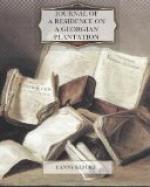The air of New England has a keen edge of liberty, which suits few Southern constitutions; and unkindly as abolition has found its native soil and native skies, that is its birthplace, and there it flourishes, in spite of all attempts to root it out and trample it down, and within any atmosphere poisoned by its influence no slaveholder can willingly draw breath. Some travel in Europe, and few, whose means permit the contrary, ever pass the entire year on their plantations. Great intervals of many years pass, and no master ever visits some of these properties: what species of attachment do you think the slave entertains for him? In other cases, the visits made will be of a few days in one of the winter months; the estate and its cultivators remaining for the rest of the year under the absolute control of the overseer, who, provided he contrives to get a good crop of rice or cotton into the market for his employers, is left to the arbitrary exercise of a will seldom uninfluenced for evil, by the combined effects of the grossest ignorance and habitual intemperance. The temptation to the latter vice is almost irresistible to a white man in such a climate, and leading an existence of brutal isolation, among a parcel of human beings as like brutes as they can be made. But the owner who at these distant intervals of months or years revisits his estates, is looked upon as a returning providence by the poor negroes. They have no experience of his character to destroy their hopes in his goodness, and all possible and impossible ameliorations of their condition are anticipated from his advent, less work, more food, fewer stripes, and some of that consideration which the slave hopes may spring from his positive money value to his owner,—a fallacious dependence, as I have already attempted to show, but one which, if it has not always predominating weight with the master, never can have any with the overseer, who has not even the feeling of regard for his own property to mitigate his absolutism over the slaves of another man.
There is a very powerful cause which makes the prosperity and well-being (as far as life is concerned) of most masters a subject of solicitude with their slaves. The only stability of their condition, such as it is, hangs upon it. If the owner of a plantation dies, his estates may fall into the market, and his slaves be sold at public auction the next day; and whether this promises a better, or threatens a worse condition, the slaves cannot know, and no human being cares. One thing it inevitably brings, the uprooting of all old associations; the disruption of all the ties of fellowship in misery; the tearing asunder of all relations of blood and affection; the sale into separate and far distant districts of fathers, mothers, husbands, wives, and children. If the estate does not lie in the extreme south, there is the vague dread of being driven thither from Virginia to Georgia, from Carolina to Alabama, or Louisiana, a change which, for reasons I have shown above, implies the passing from a higher into a lower circle of the infernal pit of slavery.




